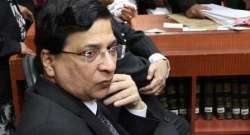Dipak Misra, next Chief Justice of India: Having delivered key verdicts, ‘eloquent’ judge set for a busy tenure
Senior most Supreme Court Judge Justice Dipak Misra has been appointed as the 45th Chief Justice of India (CJI) and will succeed incumbent Justice Jagdish Singh Khehar, who retires on August 28

Senior most Supreme Court Judge Justice Dipak Misra has been appointed as the 45th Chief Justice of India (CJI) and will succeed incumbent Justice Jagdish Singh Khehar, who retires on August 28.
Considered one of the most eloquent judges in the apex court, 63-year-old Justice Misra has given several key verdicts, which include sending Mumbai blasts convict Yakub Memon and four men who raped and killed a physiotherapy intern to the gallows.
Appointed as a Supreme Court judge in October 2011, Justice Misra headed the bench that rejected Mumbai serial blasts verdict Yakub Memon’s plea for stay on his execution and that which upheld the death sentence awarded to Nirbhaya’s killers.
Hearing the sensational December 16, 2012, Nirbhaya gangrape and murder case, he had stated, “The brutal, barbaric and diabolic nature of the crime could create a tsunami of shock to destroy a civilised society”.
Justice Misra also headed the Supreme Court bench which upheld the constitutional validity of the 156-year-old penal laws of defamation, holding that the “reputation of one cannot be allowed to be crucified at the altar of the other’s right of free speech”.
It said these did not muzzle free speech and asked the petitioners—which included Rahul Gandhi, Subramanian Swamy and Arvind Kejriwal —to face trial.
During his tenure as the Delhi High Court Chief Justice, he had directed states and Union Territories to upload FIRs on their websites within 24 hours for enabling accused and others to file appropriate pleas in the courts for redress.
Justice Misra was also part of the bench that rejected Uttar Pradesh government’s decision to provide reservation in promotion. The bench upheld the Allahabad High Court judgement that reservation in promotions can be provided only if there is sufficient data and evidence to justify it.
In an order, hailed by nationalist organisations, Justice Misra mandated the playing of the national anthem before the screening of films in cinema halls.
Justice Misra, who will have a tenure of just over 13 months as the CJI after he takes over on August 28, has a sensitive assignment on hand — the vexatious title dispute in the Ram Mandir and Babri Masjid case.
His tenure will be a busy one, for as the CJI he will be part of benches deciding on crucial issues such as, apart from the Ayodhya title case, the Cauvery waters dispute, SEBI-Sahara payment issue, BCCI reforms, the Panama Paper leaks and on privacy policy.
Justice Misra, who was enrolled as an advocate in 1977, had practised in constitutional, civil, criminal, revenue, service and sales tax matters in the Orissa High Court and Tribunals before being elevated to the High Court bench. He was appointed Additional Judge of the Orissa High Court in January, 1996, after which he was transferred to the Madhya Pradesh High Court in March, 1997.
In 2009, Justice Misra became the Chief Justice of the Patna High Court and assumed charge as the Chief Justice of the Delhi High Court in May, 2010. He was appointed a Judge of the Supreme Court of India on October 10, 2011.
(With agency inputs)